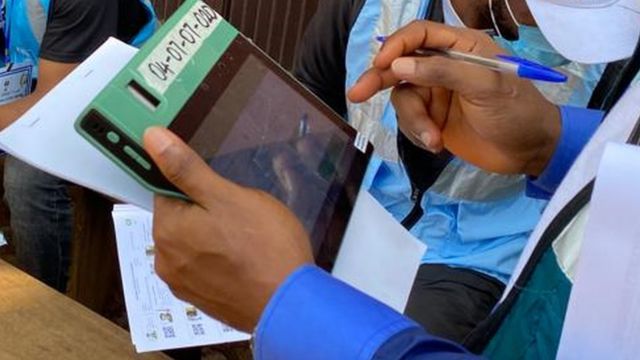Widely celebrated as a step towards greater transparency and accountability in the nation’s electoral process, Nigeria now has a new electoral law that guarantees greater independence for its electoral umpire, the Independent National Electoral Commission or INEC.
The Electoral Act Amendment Bill signed into law last week by President Mohammadu Buhari allows INEC to transmit election results electronically. Stakeholders say it would eradicate the erstwhile cumbersome, tardy and vulnerable manual transmission and collation of election results subject to human interference.
They say it would also increase trust and give legal credence to the use of technology in the nation’s future elections. Nigeria is preparing for general elections next year between February and March.
Section 47 gives legislative backing to the use of technology like the smart card readers and the Bi-Modal Voter Accreditation System (BVAS) by INEC.
Section 47 (2) & (3) states as follows:
To vote, the presiding officer shall use a smart card reader or any other technological device that may be prescribed by the Commission for the accreditation of voters, to verify, confirm or authenticate the particulars of the intending voter in the manner prescribed by the Commission.
Where a smart card reader or any other technological device deployed for accreditation of voters fails to function in any unit and a fresh card reader or technological device is not deployed, the election in that unit shall be cancelled and another election shall be scheduled within 24 hours if the Commission is satisfied that the result of the election in that polling unit will substantially affect the final result of the whole election and declaration of a winner in the constituency concerned.
These provisions would enhance the credibility and safety of votes cast during elections and ensure timely announcement of election results.
INEC, in making a case for the introduction of technology in the nation’s electoral process, had in a position paper in 2021 said that: “Excessive delays in collating and announcing results fuels feelings that outcomes could be undermined. In many cases, this is conducive to violence and negative mobilisation by losers of elections. Electronic transmission of results will make results management more efficient and increase public confidence in the electoral process.”
Accordingly, section 50 of the new law gives INEC the legal backing for electronic transmission of election results, which would address concerns of human interference and manipulations that come with manually transmitting election results.
After assenting to the bill, President Buhari described the law as “both reformative and progressive.” He said it would “improve and engender clarity, effectiveness and transparency of the election process, as well as reduce to the barest minimum incidences of acrimony arising from dissatisfied candidates and political parties.”
In the meantime, the Inter-Party Advisory Council, IPAC, has said that all hands must be on deck to ensure that the “revolutionary and transformative provisions” of the Electoral Act go beyond mere paperwork to realities in the conduct of elections in the country.
IPAC chairman, Yabagi Sani, said this during a press briefing with journalists, calling on INEC to take full advantage of the Act by ensuring that provisions are implemented.
“We are calling on INEC to take full advantage of the Act through scrupulous and dedicated implementation. Because to whom much is given, much is also expected; the Commission must now realise that the ball is in its court as Nigerians and the entire world look up to it for future elections characterised by integrity, credibility and less acrimonies,” Sani said.






